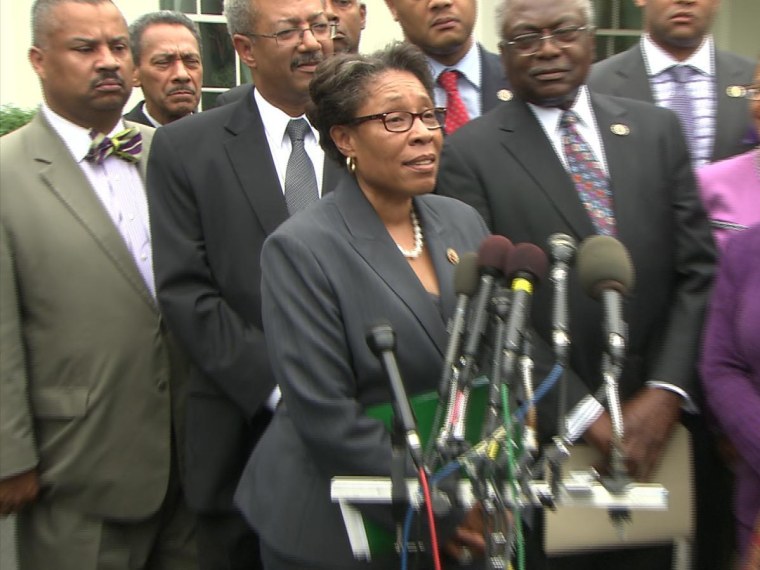Members of the Congressional Black Caucus met with President Obama at the White House for the first time in over two years to map out a path forward after the Voting Rights Act was gutted by the Supreme Court last month.
CBC Chairwoman Marcia Fudge told reporters that the meeting began with a discussion how Congress can "try to put in place what the Supreme Court has asked us to do" by restoring Section 4 of the Voting Rights Act, including "other ways to determine a formula, as opposed to doing it by the state."
Although long-time civil rights activist Rep. John Lewis recently told Rev. Sharpton he believes congressional Republicans and Democrats will come together to restore the Voting Rights Act will be restored by Congress, many Republicans have expressed pessimism at that prospect.
Tuesday's conversation on voting rights also included discussion of the broader and still intact Section 2 of the Voting Rights Act, and how the Justice Department plans to retool its efforts to protect voting rights after losing its ability to pre-clear laws passed in certain states and jurisdiction.
Unemployment in the black community dominated the conversation. The African-American unemployment rate rose slightly in June to 13.7%, and has remained significantly higher than the general population's unemployment rate since the president took office in 2009.
CBC members advocated the president pursue a work to target funding to help improvement both education and job opportunities, arguing that bigger allocations of funds for infrastructure projects and educational resources should be sent to communities with a higher poverty rate.
"It can be education, it can be broadband deployment, it can be water, sewage development. Whatever you're doing to improve communities, make sure it gets to communities of need," Rep. Jim Clyburn said. "It creates jobs dramatically."
The conversation also touched briefly on immigration reform, with members urging the president to advocate a fully comprehensive reform plan that includes solutions for immigrants from the Caribbean and Africa.
Fudge squashed concerns over the length of time that has passed since the president last hosted the CBC at the White House.
"The rise of communication has not only been open but will actually have broader and deeper discussions as a result of our meeting today, but we have been having conversations with the White House since I became chair," Fudge said.
"Certainly there are some obvious difference in how we think things should move forward and how the White House wants to move them forward, but we are on the same page," she added later.
She also dismissed concerns over diversity in the president's cabinet, having written a letter to Obama in March that complaining his appointments in his second term "have hardly been reflective of this country’s diversity."
Tuesday, when asked about the issue, Fudge said she "thanked the president for Anthony Foxx and for Mel Watt."
Both nominations came after Fudge's letter, with former Charlotte Mayor Foxx confirmed as Transportation Secretary last week and Rep. Watt was nominated to head the Federal Housing Finance Agency. Watt has faced resistance from Republicans in confirmation hearings.
